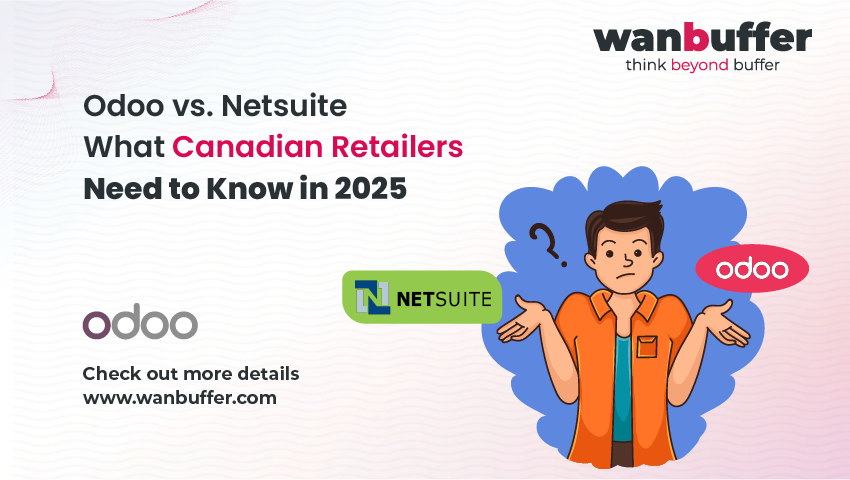
Table of Contents
1. Introduction
In 2025, Canadian retailers face increasing pressure to stay competitive through operational efficiency, omnichannel integration, and personalized customer experiences. One of the core tools enabling this transformation is a powerful Enterprise Resource Planning (ERP) system. Among the top contenders are Odoo and Oracle NetSuite — but which one is right for Canadian retailers?
This blog breaks down key differences between Odoo and NetSuite, focusing on functionality, pricing, localization, and long-term growth for Canadian businesses.
2. Why Canadian Retailers Are Reassessing ERP Systems
Canada’s retail market has seen a rapid digital shift — accelerated by consumer expectations, labor shortages, and rising e-commerce demand. Traditional systems often lack:
- Real-time inventory visibility
- Integrated eCommerce and PoS
- Flexible reporting tailored to Canadian tax standards
- Cost-effective scalability for SMEs
As a result, many are exploring ERP platforms that can support omnichannel operations, automation, and localized compliance.
3. Odoo vs. NetSuite – Feature Comparison
Both Odoo and NetSuite offer comprehensive features to manage a retail business, but their approach differs.
Odoo provides a highly modular, open-source system that allows retailers to start small and scale over time. It includes out-of-the-box apps for inventory, sales, eCommerce, and point of sale — all built into one ecosystem. The platform is known for its user-friendly interface and affordability, making it ideal for small to mid-sized Canadian businesses.
NetSuite, on the other hand, offers a powerful all-in-one cloud solution geared more toward enterprises. It’s packed with advanced features for financials, inventory, supply chain, and procurement. However, its higher complexity and cost make it less accessible for small retailers.
4. Cost Efficiency & Licensing Models
- Odoo:
- Modular pricing — Pay only for what you use
- Lower upfront and implementation costs
- Open-source version for added flexibility
- NetSuite:
- Subscription-based, bundled pricing
- Higher total cost of ownership
- Mandatory partner support often adds to the cost
For Canadian SMEs, Odoo typically delivers a better return on investment, especially for those needing tailored workflows without enterprise-level pricing.
Explore how Odoo is transforming Canadian retail.
5. Localization & Compliance in Canada
Retailers in Canada must comply with:
- GST/HST/PST regulations
- Bilingual invoicing (English & French)
- Data sovereignty laws
Odoo offers:
- Canadian-specific accounting modules
- Full bilingual support
- Custom tax rules by province
- Local hosting options for data compliance
NetSuite supports Canadian compliance too but may require third-party localization apps or expensive customizations.
6. Scalability & Integration
- Odoo: Allows gradual scaling — add apps as your business grows. Ideal for retailers expanding from local to multi-channel operations.
- NetSuite: Provides enterprise-grade scale upfront — suited to larger firms with global operations and high IT budgets.
Odoo’s API-first approach and integration-friendly modules give Canadian retailers more control over tech stack evolution.
7. Support Ecosystem & Community
- Odoo: Strong global community, vast network of certified partners (including Canadian-based), open forums, and fast iteration cycles.
- NetSuite: Oracle-backed enterprise support, but more dependent on certified consultants and slower update feedback loop.
Retailers seeking fast, hands-on support often find Odoo’s ecosystem more responsive and cost-efficient.
8. Final Verdict
For Canadian retailers in 2025, both platforms have strengths. But:
- Choose Odoo if you’re an SME or mid-market retailer looking for a cost-effective, flexible, and Canada-compliant ERP.
- Choose NetSuite if you’re a larger enterprise with global operations and an established Oracle ecosystem.
Contact Wan Buffer Services — we specialize in helping Canadian businesses implement tailored Odoo solutions that scale with your retail goals. Whether you run an online storefront, brick-and-mortar chain, or hybrid model — we’ve got you covered.
9. FAQs
-
Is Odoo a good choice for small retailers in Canada?
Yes, Odoo is an excellent option for small to mid-sized Canadian retailers. It offers modular pricing, Canadian tax compliance, and flexible customization, making it ideal for growing businesses with limited budgets.
-
Does Odoo support bilingual documentation and Canadian accounting standards?
Absolutely. Odoo supports bilingual invoice templates (English and French) and includes features tailored to Canadian accounting practices, including GST, HST, and PST.
-
How does NetSuite compare to Odoo in terms of cost?
NetSuite is generally more expensive than Odoo. It uses a bundled pricing model that includes features you may not need, while Odoo lets you pay only for the modules you use — offering better cost control and scalability for smaller businesses.

